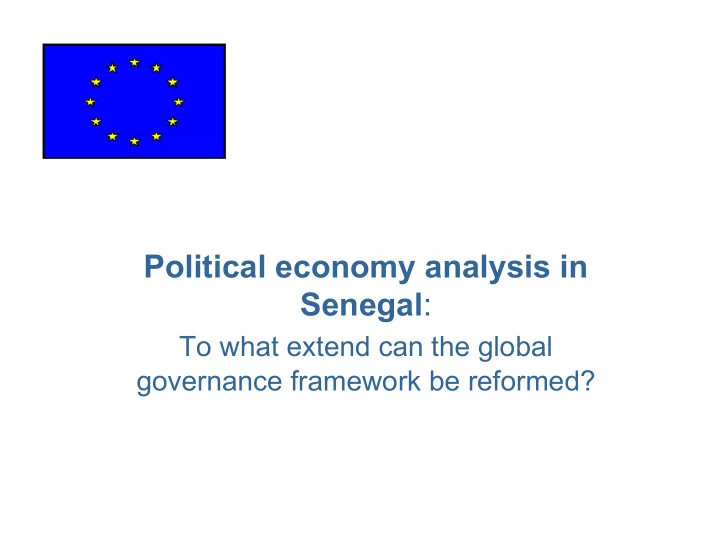

Political economy analysis in Senegal : To what extend can the global governance framework be reformed?
Background 2011/2012: 2 years of democratic transition • 23 June 2011: violent protest against proposed change of Constitution • EU pushed for withdrawal of constitutional change proposal
Background M 23 created by civil society ( Y en a marre ) joined by political parties
Background M 23 created by civil society ( Y en a marre ) joined by political parties
Background : electoral campaign focus on governance • Political campaign of the opposition parties focused on radical changes of the governance system • EU with EU MS act as a mediator • EU Electoral Observation Mission from January to March 2012 • Macky SALL wins on the 2 nd tour on 25 March 2012 with the support of all opposition parties • President Macky SALL wants the EU to assist on governance reforms
Launching a PEA“ who, how and what ?” • Governance reform was on all the agendas: government, civil society, donors • Programming of 11th EDF was starting: what could be realistically be expected ? Which were the windows of opportunities ? With whom to work ? • ECDPM was a natural partner :Jean Bossuyt was interested and he proposed to work with Professor Ismael Madior Fall . • We had also already initiated a civil society mapping and a diagnosis of the functioning of the National Assembly and completed recently a PEFA • We wanted to associate key Senegalese stakeholders and make the exercise as open as possible
Launching a PEA“ who, how and what ?” How did the PEA unfold ? • Spread in time from March 2012 to March 2013 • Close cooperation with delegation staff ( all sections) • Public process with large consultation of numerous stakeholders • Restitution to national authorities ( Minister of Good Governance, Presidency) , parlementarians, civil society, academics • Two documents: a long version and a short one still on the Delegation Website: http://www.eeas.europa.eu/delegations/senegal/index_fr.htm
Launching a PEA“ who, how and what ?” What ? • Decision to assess the global governance framework • Good analysis of both the political and economic models entrenched in the Senegalese society: the social contract between political power and other groups based on reciprocal rewards. Privileged access to public resources by the elites and redistribution networks. • Useful analysis of the key actors in particular the role of the Muslim “ Brotherhoods’. • Identification of the sources of revenues : land, mines, forests, fisheries, energy supply, donor assistance.
Launching a PEA“ who, how and what ?” What ? • Identification of potential reform actors : Court of Auditors, Public Procurement Authority, CENTIF, Citizen movements, UEMOA • Leverage for change: Institutional reforms Public sector reform Budget processes Fiscal reform Local economic development Transparency and accountability
Did it help ? On the government side: steps in the right direction in number of areas identified in PEA: • Reduction of presidential mandate to 5 years • Creation of OFNAC ( anticorruption office) • Activation of the CREI ( Wade’s son sentenced) • Civil servants Data Base linked to payroll • Fiscal Reform /Budget more transparent • End illegal fishing / EU agreement signed • Land reform Commission launched • Adoption of PLAN SENEGAL EMERGENT
Did it help ? On the government side: many challenges remain: • Clientelism is persistent: family and clan prevailed in local elections • No transparency in the financing of political parties ; corruption practices continue • Hyper presidentialism , rubber stamped NA • Power of elites with privileged access to resources in the area of forestry ( reformist Minister dismissed) , land, oil supply … • Religious Brotherhoods keep special status
Did it help ? On the EU side: it depends on where you sit … • Delegation perspective: very useful . Helped the programming, choice of sectors & actors to support . EU position reinforced • Headquarters perspective : “ it went to far … it was dangerous for our relationship … ” Choice of sectors was to be decided by HQ. Governance was not an issue since the democratic transition went well.
Did it help ? • PEA = Useful tool to understand the politics and economics behind public policies and assess chances and obstacles to reforms • PEA needs to be contextualised • good communication between delegations and HQ and within HQ should be ensured • Flexibility of EU instruments is needed
Recommend
More recommend